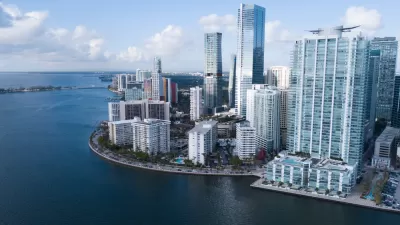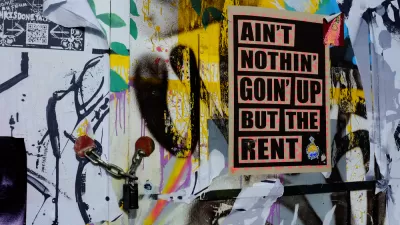New data shows stratospheric housing costs in cities not named New York.

First it was Austin; now it's Miami. There is no longer an undisputed champion of the U.S. housing affordability crisis.
The RealtyHop Affordability Index for February identifies Miami as the least affordable city in the United States, above even New York (#2) and Los Angeles (#3). The report used projected median household income, local property tax data from the American Community Survey, and median for-sale home listing prices via RealtyHop data to create the index.
An article by Katherine Kallergis for the Real Deal provides more insight into the report's findings and context for the city's housing market. According to Kallergis, Miami's soaring housing prices are "propelled by the migration of out-of-state buyers and renters, many of whom have moved from the Northeast," and the relatively slow growth of wages over the same period.
The for-sale market isn't the only sign of Miami's runaway housing market. In December 2021, a separate report by Zumper estimated that rents were growing faster in Miami than anywhere else in the country. An article by Susannah Cavanaugh shares insight into the Zumper report.
Both the Zumper report and the RealtyHop warrant a caveat about housing price figures that rely on online listings, which can distort their picture of the market, as documented by numerous media observers over the years, including an article by Joe Cortright from 2018.
With those caveats in mind, it's still notable that the list of undisputed "most expensive cities" in the United States is shifting into new corners of the Sunbelt. The RealtyHop report comes just a few months after a Zillow forecast predicted Austin would soon be the most expensive homebuying market ouside California, for example. The runaway housing market has crossed state lines.
FULL STORY: Miami becomes least affordable housing market in the US

Planetizen Federal Action Tracker
A weekly monitor of how Trump’s orders and actions are impacting planners and planning in America.

Map: Where Senate Republicans Want to Sell Your Public Lands
For public land advocates, the Senate Republicans’ proposal to sell millions of acres of public land in the West is “the biggest fight of their careers.”

Restaurant Patios Were a Pandemic Win — Why Were They so Hard to Keep?
Social distancing requirements and changes in travel patterns prompted cities to pilot new uses for street and sidewalk space. Then it got complicated.

Platform Pilsner: Vancouver Transit Agency Releases... a Beer?
TransLink will receive a portion of every sale of the four-pack.

Toronto Weighs Cheaper Transit, Parking Hikes for Major Events
Special event rates would take effect during large festivals, sports games and concerts to ‘discourage driving, manage congestion and free up space for transit.”

Berlin to Consider Car-Free Zone Larger Than Manhattan
The area bound by the 22-mile Ringbahn would still allow 12 uses of a private automobile per year per person, and several other exemptions.
Urban Design for Planners 1: Software Tools
This six-course series explores essential urban design concepts using open source software and equips planners with the tools they need to participate fully in the urban design process.
Planning for Universal Design
Learn the tools for implementing Universal Design in planning regulations.
Heyer Gruel & Associates PA
JM Goldson LLC
Custer County Colorado
City of Camden Redevelopment Agency
City of Astoria
Transportation Research & Education Center (TREC) at Portland State University
Camden Redevelopment Agency
City of Claremont
Municipality of Princeton (NJ)





























